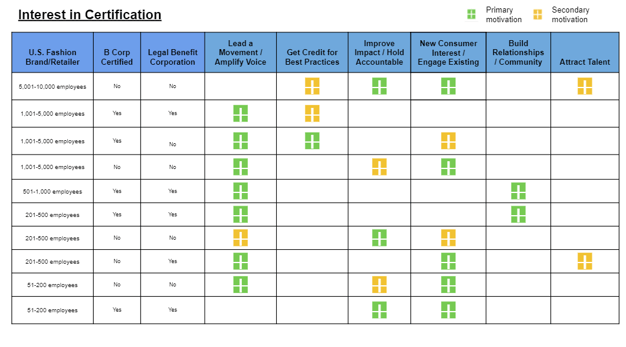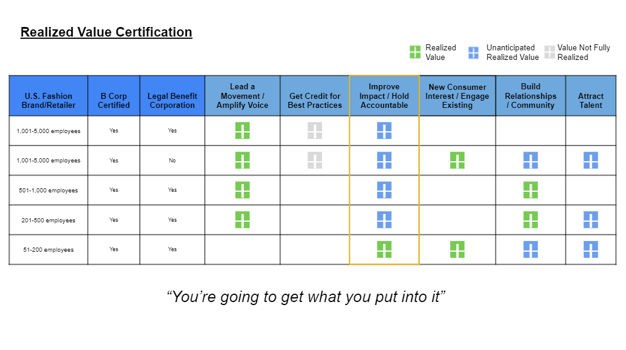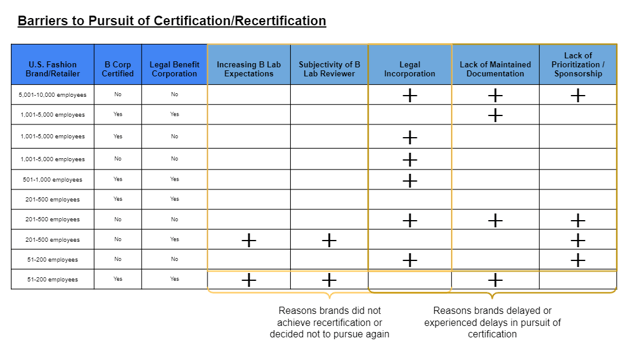Looking to become a more purpose-driven company? B Corp Certification may be your answer.

So Your Stakeholders Want You to Be a Purpose-Driven Retailer?
The concept of a purpose-driven business is not new, but in recent years the demands for retailers to make this shift are growing louder. A 2020 Deloitte publication, “Leading with Purpose”, reports that 75% of millennials would take a pay cut to work at an environmentally responsible company and 73% are willing to pay a premium for sustainable goods. Engaging platforms, like Remake, provide consumers with a way to re-evaluate who they are buying products from and scrutinize retailer business practices. With the recent election of President Joe Biden and the introduction of SASB and TCFD reporting requirements at financial institutions like Blackrock, transparency into and verification of retailer impact claims are expected to increase as well.
So how do retailers navigate adhering to these increasing expectations? Enter B Corp Certification. Retailers are recognizing that they can utilize the certification as a potential guide to grow and communicate their purpose-driven brand so that consumers, government agencies, and financial institutions alike can recognize and trust in their work. In fact, ten out of the ten retailers interviewed for this article are actively exploring B Corp Certification or recertification.
Where the B Corp Movement Meets the Purpose-Driven Road
Since the first 82 companies were certified as B Corps in 2007, the number of companies certified by B Lab has grown exponentially. Between 2016 and 2020, over 1000 companies biannually have become B Corporation Certified and there are now over 3500 certified companies, across a range of industries, in over 70 countries.
B Lab touts six values that come with certification on their website:
● Build Relationships
● Attract Talent
● Lead a Movement
● Improve Impact
● Amplify Voice
● Protect Your Mission
Based on our ten retailer interviews, five of these values were affirmed (“Protect Your Mission” was not reported as a primary or secondary reason to pursue certification) and two additional values were uncovered: “Engage Consumers” and “Get Credit for Best Practices”. Some of the B Lab-affirmed values were blended together through the way brands discussed them such as “Lead a Movement” / “Amplify Voice” and “Improve Impact” / “Hold Accountable”.
“Lead a Movement/Amplify Voice” was consistently articulated by most retailers as an initial reason to pursue certification, with “Improve Impact/Hold Accountable” and “Engage Consumers” emerging as value categories growing in prioritization. This shift can be attributed to the change in expectations for brands to be purpose driven and transparent. One retailer suggested that you are not really a ‘leader’, you are more of a ‘follower’ if you pursue certification now. Similar points made by other brands indicate the value of “Lead a Movement''
is blending with “Amplify Voice'' as the opportunity for leadership shifts to more of a collective leadership effort. The certification is accelerating a collaborative form of capitalism, in which pre-competitive collaboration is harnessed to pursue a triple bottom line, rather than the individualistic and profit-driven form of capitalism of the past five decades.
So while achieving B Corp Certification may not make you a pioneer, it is still perceived by those pursuing it as a proactive tool to both align with consumers’ values and prepare for future rigorous reporting standards. The rigor of the certification’s B Impact Assessment and overall application process was emphasized by all six of the retailers that have achieved B Corp Certification and made the process more lengthy than many anticipated. Despite this, all six B Corps recognized the assessment itself as a tool they strategically leverage to evaluate and motivate investments in social, environmental, and governance practices. Beyond this internal benefit, all brands actively exploring the certification suggested they hoped to achieve external facing value through using the certification to concisely communicate commitment to a greater purpose, beyond profit.


B Corp Certification is Not Just a Tool for Brands, but Their Customers and Investors, Too.
Retailers are challenged to concisely and clearly communicate to consumers that they are an authentic, purpose-driven brand. At the same time, consumers and investors are challenged to interpret brand messages and validate their authenticity. Many are skeptical of company claims based on a history of greenwashing, in particular within the retail industry.
The B Corp logo has not had a historical impact on influencing consumers, but some think that awareness is growing. When Athleta was certified in 2018, they affixed the B Corp logo to their store windows and equipped their retail store staff to educate consumers unfamiliar on the meaning behind the logo. Just this year, in 2021, Allbirds placed a full page ad in The New York Times and positioned the B Corp logo alongside their brand name, in equal size to its own logo. So, as retailers look for more ways to communicate their efforts to drive positive impact and investment drives awareness in the logo, its value as a concise and effective communication tool could grow.
So You Want to Be a B Corp? Be Prepared to Invest Time and Money.
When most companies consider pursuing B Corp Certification, they often focus solely on the assessment. Although a significant amount of time to fill out the assessment and acquire documentation should be expected, additional human and financial capital may be necessary after and even during the application process itself. Some companies find they need to identify and invest in enhancing internal practices that could increase the likelihood of passing the assessment during the application phase. Others have made the decision to invest supplemental time and financial resources after achieving certification, investing in educating their consumers and other stakeholders to recognize the meaning behind B Corp Certification.
Executive sponsorship also plays a major role in investments, as it empowers and motivates departments to prioritize preparing documentation to complete the assessment and incorporating short and long term strategies. (All five certified B Corps had executive sponsorship when they applied.)
The most frequently cited challenge that companies face is B Corps’ legal requirement. Some retailers have been forced to delay pursuit of the certification due to it, while one retailer1 reported that they opted out of pursuing recertification because they did not want to pursue the updated legal requirements.

Despite these reported investment expectations and challenges, all ten retailers affirmed their interest in pursuing B Corp Certification or recertifying.
The road to becoming a purpose-driven company is not simple and neither is pursuing B Corp Certification. That said, whether a company achieves certification or not, the process can generate real value and provide strategic direction to mobilize internal employees. As one retailer stated, “You get what you put into it.”
Amy Schatz is a graduate student at the University of Michigan, pursuing a dual Master’s in Business Administration and Master’s in Environment and Sustainability through the Erb Institute for Global Sustainable Enterprise (anticipated graduation December 2022). Prior to starting graduate school this past Fall 2020, Amy was a Senior Consultant at Triage Consulting Group (2017-2020). Her coursework and leadership roles with the Retail and Luxury Goods and Ross Net Impact Clubs have led her to focus on the intersection of social and environmental impacts within the retail industry. Through conversations and small projects with leaders in the retail industry, Amy is driven to explore how businesses can be used as a force for good.
Annie Zaro is a graduate student at the University of Michigan, pursuing a dual Master’s in Business Administration and Master’s in Environment and Sustainability through the Erb Institute for Global Sustainable Enterprise (anticipated graduation December 2022). Since starting her dual degree program, she has served as a Director of Professional Development in the University of Michigan Ross Net Impact chapter between 2020-2021 and continues to be an active member. She spent 3.5 years in healthcare consulting at Huron Consulting Group and 3.5 years in strategic sourcing at Stitch Fix prior to returning to school in the fall of 2020. Annie is passionate about transforming the retail industry into a more socially responsible and climate positive industry.
***Between January and April 2021, we researched the history of B Lab (the nonprofit behind B Corp Certification), read published case studies and thought pieces about B Corp Certification, spoke with a B Lab Community Leader, and interviewed ten retailers (5 currently certified B Corps, including Allbirds, The Renewal Workshop, and Eileen Fisher, 1 formerly certified B Corp, and 4 non-certified B Corps). Through this research, we discovered a range of values that lead retailers perceive as reasons to pursue B Corp Certification and ultimately realize through application for and achievement of certification.
We would also like to thank Kevin Thompson, Jerry Davis, and Christina Brown for their advice and guidance with our work.
1 This retailer declined an interview due to time constraints, but communicated via email about their decision to not pursue recertification.




